Managing High Blood Pressure (Hypertension): Symptoms, Causes, and Natural Remedies
Managing High Blood Pressure (Hypertension) : Symptoms, Causes, and Natural Remedies

Introduction:
High blood pressure, also known as hypertension, is a prevalent medical condition characterized by elevated blood pressure levels in the arteries. It’s a significant risk factor for various cardiovascular diseases, including heart attacks, strokes, and kidney problems. Managing hypertension effectively is crucial for overall health and well-being. In this comprehensive guide, we will delve into the symptoms, causes, and natural remedies for managing high blood pressure.
I. Understanding High Blood Pressure:
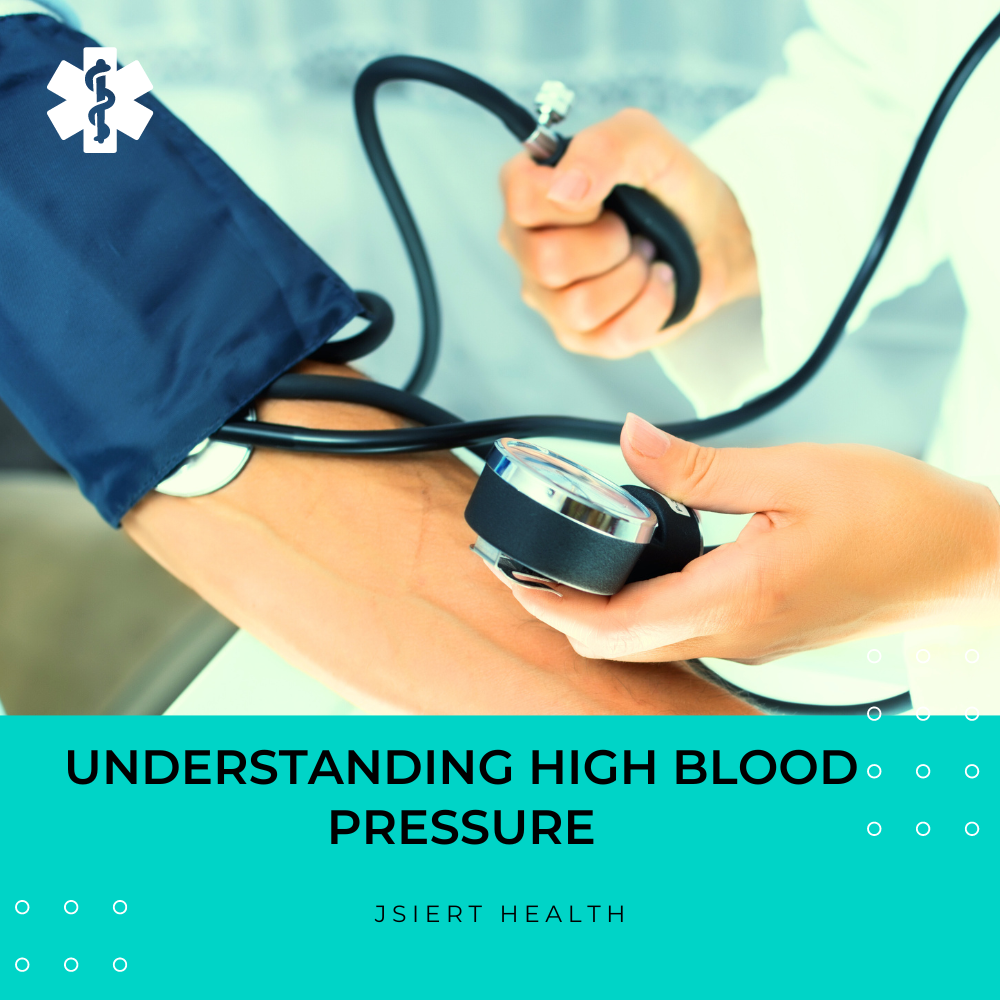
A. Definition and Classification of Hypertension:
Hypertension, commonly known as high blood pressure, is a medical condition characterized by elevated pressure exerted by blood against the walls of arteries. It’s typically diagnosed through blood pressure readings, which measure the force of blood as it flows through the arteries. The classification of hypertension is based on the severity of blood pressure elevation and includes the following categories:
- Normal Blood Pressure: Systolic blood pressure (SBP) below 120 mmHg and diastolic blood pressure (DBP) below 80 mmHg.
- Elevated Blood Pressure: SBP ranging from 120 to 129 mmHg and DBP below 80 mmHg.
- Stage 1 Hypertension: SBP ranging from 130 to 139 mmHg or DBP ranging from 80 to 89 mmHg.
- Stage 2 Hypertension: SBP of 140 mmHg or higher or DBP of 90 mmHg or higher.
- Hypertensive Crisis: SBP higher than 180 mmHg and/or DBP higher than 120 mmHg, requiring immediate medical attention.
B. Blood Pressure Measurement: Systolic vs. Diastolic:
Blood pressure is measured using two numbers: systolic pressure (the top number) and diastolic pressure (the bottom number).
- Systolic Pressure (SBP): Represents the maximum pressure exerted by the heart when it contracts and pumps blood into the arteries. It is measured when the heart beats.
- Diastolic Pressure (DBP): Represents the minimum pressure in the arteries when the heart is at rest between beats. It is measured when the heart relaxes and fills with blood.
Blood pressure is typically expressed in millimeters of mercury (mmHg), with the systolic pressure written over the diastolic pressure (e.g., 120/80 mmHg).
C. Prevalence and Impact of High Blood Pressure:
High blood pressure is a global health concern with significant prevalence and impact. It affects people of all ages, genders, and ethnicities, but its prevalence tends to increase with age. According to the World Health Organization (WHO), hypertension affects approximately 1.13 billion people worldwide.
The impact of high blood pressure on health is profound. It is a leading risk factor for cardiovascular diseases such as heart attacks, strokes, heart failure, and peripheral artery disease. Additionally, hypertension can damage vital organs such as the kidneys, eyes, and brain, leading to complications such as chronic kidney disease, vision loss, and cognitive impairment.
D. Risk Factors Associated with Hypertension:
Several factors contribute to the development of hypertension, including:
- Age: Blood pressure tends to increase with age, with the risk of hypertension rising significantly after the age of 65.
- Family History: Individuals with a family history of hypertension are at higher risk of developing the condition themselves.
- Lifestyle Factors: Unhealthy lifestyle habits such as poor diet, lack of physical activity, excessive alcohol consumption, and tobacco use increase the risk of hypertension.
- Obesity: Being overweight or obese places additional strain on the heart and blood vessels, leading to elevated blood pressure.
- Ethnicity: Certain ethnic groups, including African Americans, are at higher risk of developing hypertension and experiencing more severe complications.
- Medical Conditions: Underlying medical conditions such as diabetes, high cholesterol, kidney disease, and sleep apnea can contribute to the development of hypertension.
- Stress: Chronic stress and anxiety can lead to elevated blood pressure levels over time.
Understanding these risk factors is essential for early detection, prevention, and management of hypertension. By addressing modifiable risk factors through lifestyle modifications and appropriate medical interventions, individuals can reduce their risk of developing high blood pressure and its associated complications.
II. Symptoms of High Blood Pressure:
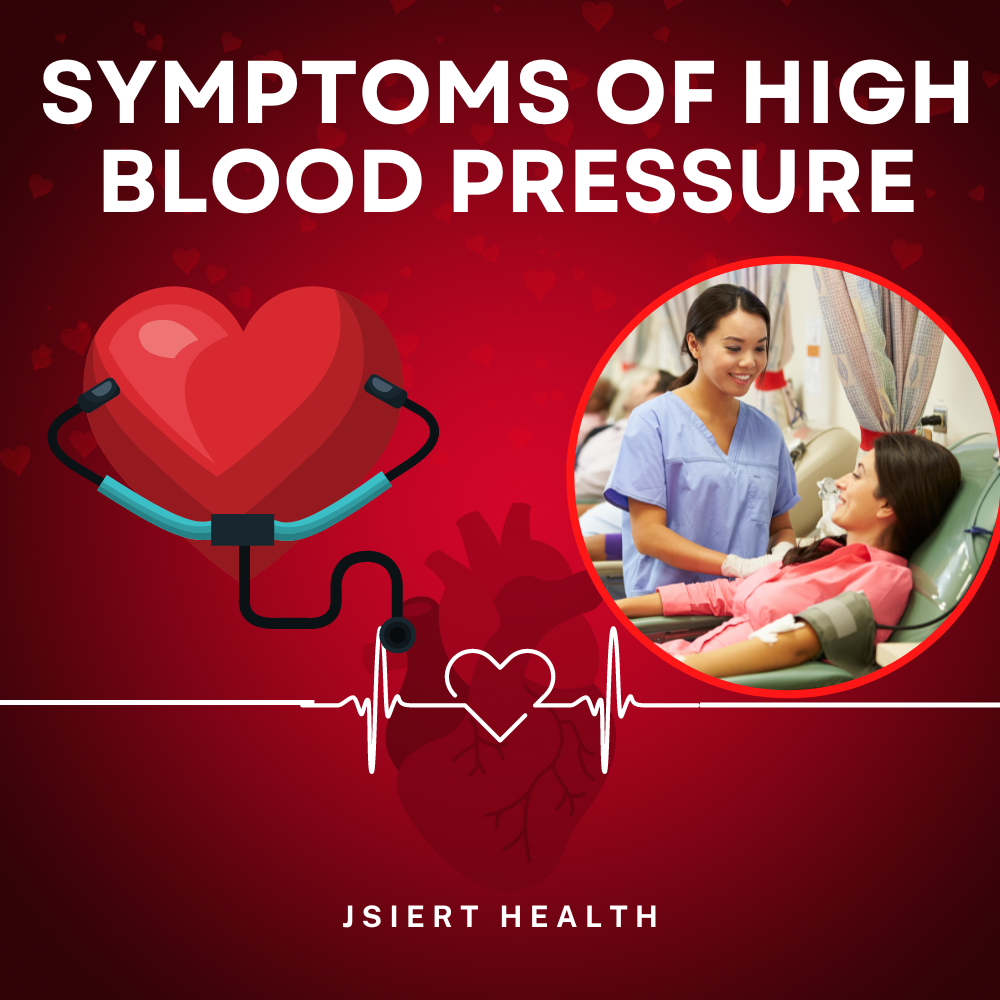
A. Overview of Common Symptoms:
High blood pressure is often referred to as the “silent killer” because it frequently presents without noticeable symptoms, especially in the early stages. However, some individuals may experience symptoms related to hypertension, which can include:
- Headaches: Persistent headaches, particularly at the back of the head, may occur in individuals with high blood pressure.
- Dizziness or Vertigo: Feeling lightheaded or dizzy, especially upon standing up quickly, may be a symptom of elevated blood pressure.
- Blurred Vision: Vision changes or blurry vision may occur in some individuals with uncontrolled hypertension.
- Shortness of Breath: Difficulty breathing or shortness of breath, especially during physical exertion, may be associated with high blood pressure.
- Chest Pain: Chest discomfort or pain, often described as tightness or pressure, may occur during episodes of high blood pressure.
- Fatigue: Persistent fatigue or tiredness, even after adequate rest, can be a symptom of hypertension.
- Irregular Heartbeat: Palpitations or sensations of an irregular heartbeat may occur in some individuals with high blood pressure.
B. Asymptomatic Nature of Hypertension:
It’s important to note that hypertension is often asymptomatic, particularly in the early stages. Many individuals with high blood pressure may feel perfectly healthy and may not experience any noticeable symptoms. As a result, hypertension is frequently referred to as a “silent” condition because it can remain undetected until complications arise or it is diagnosed through routine blood pressure screenings.
C. Recognizing Symptoms and Seeking Medical Attention:
While symptoms of high blood pressure may not always be present, it’s essential to recognize potential warning signs and seek medical attention if you experience any concerning symptoms or risk factors. Regular blood pressure monitoring, either at home or during routine medical check-ups, is crucial for early detection and management of hypertension.
If you experience symptoms such as severe headaches, chest pain, shortness of breath, dizziness, or vision changes, it’s important to consult a healthcare professional promptly. Additionally, individuals with known risk factors for hypertension, such as a family history of high blood pressure or underlying medical conditions, should be vigilant about monitoring their blood pressure and seeking appropriate medical care as needed.
D. Complications Arising from Uncontrolled High Blood Pressure:
Uncontrolled high blood pressure can lead to serious health complications over time, including:
- Cardiovascular Disease: Chronic hypertension is a major risk factor for heart disease, heart attacks, and strokes.
- Kidney Damage: High blood pressure can damage the kidneys and increase the risk of kidney disease or kidney failure.
- Vision Loss: Hypertension can damage the blood vessels in the eyes, leading to vision problems or even permanent vision loss.
- Peripheral Artery Disease: Narrowing or blockages in the arteries due to hypertension can reduce blood flow to the limbs, leading to pain, numbness, or tissue damage.
- Cognitive Impairment: Chronic high blood pressure has been associated with an increased risk of cognitive decline and dementia in older adults.
Managing high blood pressure effectively through lifestyle modifications, medication, and regular medical care is essential for reducing the risk of complications and maintaining overall health and well-being.
III. Causes of High Blood Pressure:
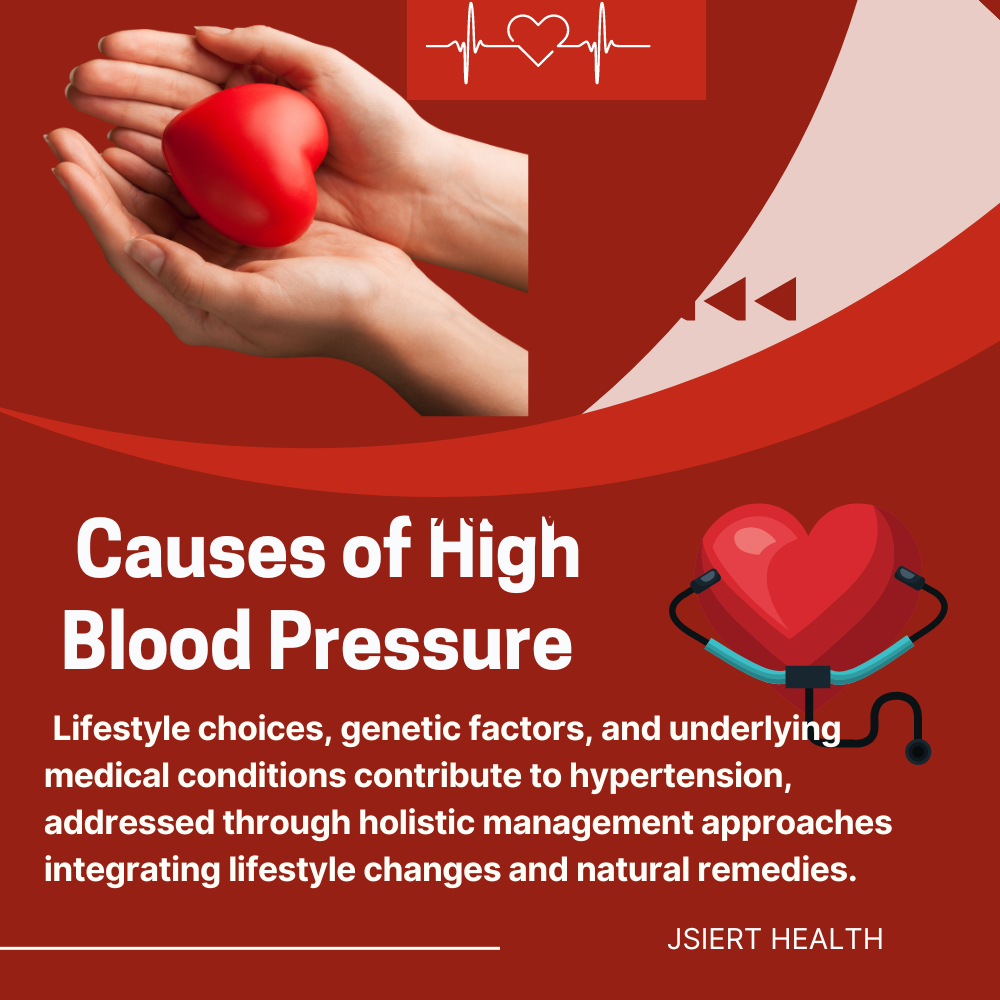
A. Primary Hypertension (Essential Hypertension):
- Genetic Factors and Family History:
- Genetic predisposition plays a significant role in the development of primary hypertension. Individuals with a family history of high blood pressure are at a higher risk of developing the condition themselves.
- Specific genetic variations and mutations may contribute to abnormalities in blood pressure regulation mechanisms, leading to chronic hypertension.
- Lifestyle Choices: Diet, Exercise, and Stress:
- Poor dietary habits, including high intake of sodium, saturated fats, and processed foods, can contribute to elevated blood pressure levels.
- Lack of physical activity and sedentary lifestyles are associated with an increased risk of hypertension. Regular exercise helps maintain healthy blood pressure levels.
- Chronic stress and inadequate stress management techniques can contribute to hypertension by activating the body’s stress response system, leading to elevated blood pressure over time.
- Age, Gender, and Ethnicity:
- Advancing age is a significant risk factor for hypertension, with blood pressure tending to increase with age due to changes in blood vessel elasticity and hormonal changes.
- Gender differences exist in the prevalence of hypertension, with men generally experiencing higher rates of hypertension at younger ages, while women have a higher prevalence after menopause.
- Certain ethnic groups, such as African Americans, Hispanics, and individuals of South Asian descent, have a higher predisposition to hypertension and its complications.
B. Secondary Hypertension:
- Underlying Medical Conditions: Kidney Disease, Thyroid Disorders, etc.:
- Secondary hypertension refers to high blood pressure that is caused by an underlying medical condition or disease. Common medical conditions associated with secondary hypertension include chronic kidney disease, renal artery stenosis, and adrenal gland disorders (e.g., primary aldosteronism, Cushing’s syndrome).
- Thyroid disorders, such as hyperthyroidism (overactive thyroid) or hypothyroidism (underactive thyroid), can disrupt hormonal balance and contribute to hypertension.
- Other medical conditions, including obstructive sleep apnea, pheochromocytoma (a rare adrenal gland tumor), and coarctation of the aorta (narrowing of the aortic arch), can also lead to secondary hypertension.
- Medications and Drugs Contributing to Hypertension:
- Certain medications, such as nonsteroidal anti-inflammatory drugs (NSAIDs), oral contraceptives, decongestants, and corticosteroids, can cause or exacerbate hypertension as a side effect.
- Illicit drugs, including cocaine, amphetamines, and certain recreational drugs, can significantly elevate blood pressure levels and contribute to the development of hypertension.
- Lifestyle Factors and Environmental Influences:
- Lifestyle factors such as excessive alcohol consumption, smoking, and illicit drug use can contribute to hypertension.
- Environmental influences, including exposure to environmental toxins (e.g., lead, mercury) and chronic stressors (e.g., noise pollution, air pollution), may also play a role in the development of hypertension.
Managing high blood pressure requires addressing underlying causes and risk factors through a combination of lifestyle modifications, medication, and targeted interventions. By identifying and addressing the root causes of hypertension, individuals can effectively manage their condition and reduce the risk of associated complications.
IV. Diagnosis and Medical Management of Hypertension:
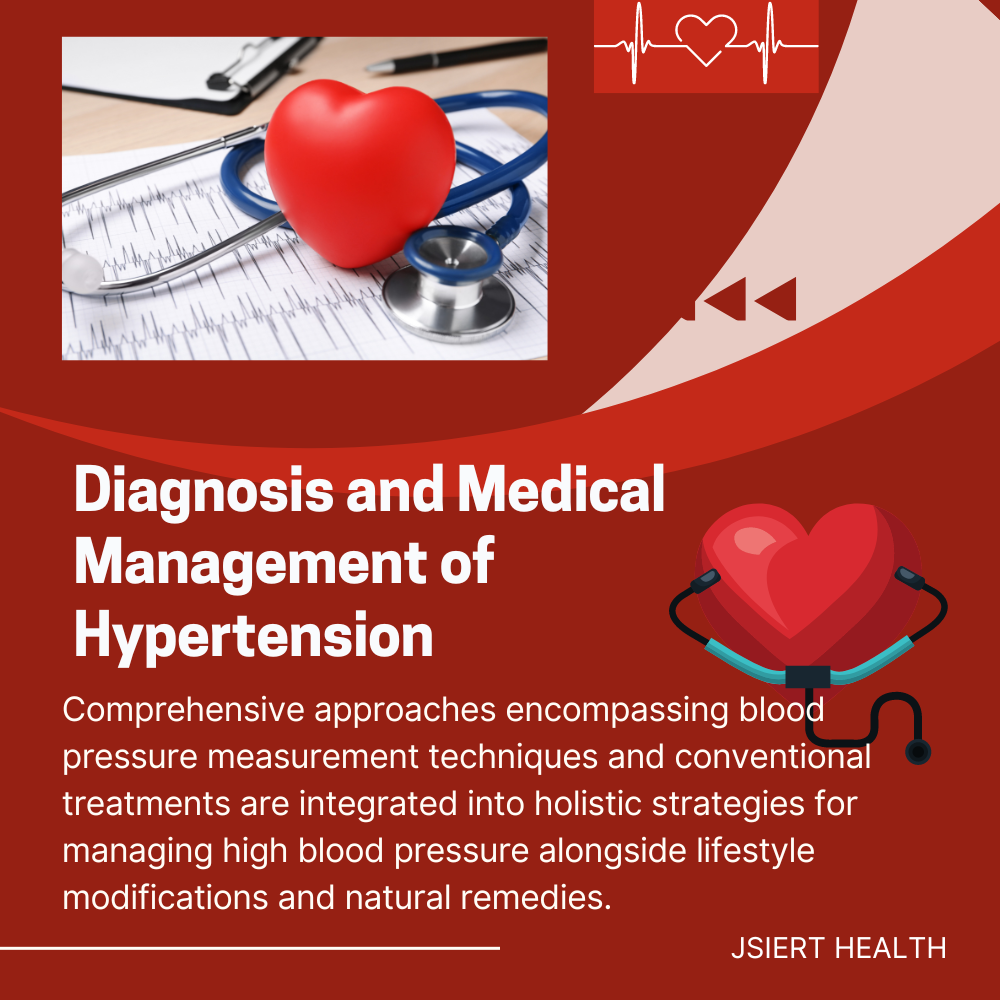
A. Blood Pressure Measurement Techniques:
Accurate measurement of blood pressure is essential for the diagnosis and management of hypertension. Common techniques for measuring blood pressure include:
- Manual Sphygmomanometry: This traditional method involves using a cuff wrapped around the upper arm, a stethoscope placed over the brachial artery, and a mercury or aneroid manometer to measure blood pressure.
- Automated Blood Pressure Monitors: These devices use oscillometric or auscultatory methods to measure blood pressure automatically. They are often used in clinical settings and may be integrated into electronic health records for easy documentation.
- Ambulatory Blood Pressure Monitoring (ABPM): ABPM involves wearing a portable blood pressure monitor that automatically measures blood pressure at regular intervals throughout the day and night. It provides valuable information about blood pressure patterns over a 24-hour period.
- Home Blood Pressure Monitoring: Home blood pressure monitors allow individuals to measure their blood pressure regularly in the comfort of their own homes. They are useful for tracking blood pressure trends and assessing the effectiveness of treatment.
B. Diagnostic Criteria for Hypertension:
The diagnosis of hypertension is based on repeated blood pressure measurements taken on different occasions. The following diagnostic criteria are commonly used:
- Normal Blood Pressure: SBP < 120 mmHg and DBP < 80 mmHg.
- Elevated Blood Pressure: SBP 120-129 mmHg and DBP < 80 mmHg.
- Stage 1 Hypertension: SBP 130-139 mmHg or DBP 80-89 mmHg.
- Stage 2 Hypertension: SBP ≥ 140 mmHg or DBP ≥ 90 mmHg.
C. Conventional Treatment Approaches: Medications and Therapies:
- Antihypertensive Medications:
- Diuretics: Reduce blood volume and lower blood pressure by increasing urine output.
- Beta-blockers: Decrease heart rate and reduce the force of heart contractions, thereby lowering blood pressure.
- ACE Inhibitors and ARBs: Relax blood vessels and inhibit the production of angiotensin II, a hormone that narrows blood vessels.
- Calcium Channel Blockers: Relax blood vessels and decrease the heart’s workload by blocking calcium from entering heart and blood vessel cells.
- Lifestyle Modifications:
- Dietary Changes: Adopting a low-sodium diet, increasing potassium intake, and following the DASH (Dietary Approaches to Stop Hypertension) diet can help lower blood pressure.
- Regular Exercise: Engaging in aerobic exercise, such as brisk walking, cycling, or swimming, for at least 30 minutes most days of the week can help lower blood pressure.
- Weight Management: Losing excess weight through a combination of diet and exercise can reduce blood pressure levels.
- Stress Reduction Techniques: Practicing relaxation techniques such as meditation, deep breathing exercises, or yoga can help lower stress levels and blood pressure.
D. Importance of Regular Monitoring and Follow-up Care:
Regular monitoring of blood pressure is essential for managing hypertension effectively. It allows healthcare providers to track changes in blood pressure over time, assess the effectiveness of treatment, and make adjustments as needed. Follow-up care is important for addressing any concerns or complications that may arise, as well as for providing ongoing support and guidance to individuals with hypertension. By staying engaged in their healthcare and adhering to recommended monitoring and follow-up schedules, individuals can take an active role in managing their blood pressure and reducing their risk of associated complications.
V. Natural Remedies for Managing High Blood Pressure:
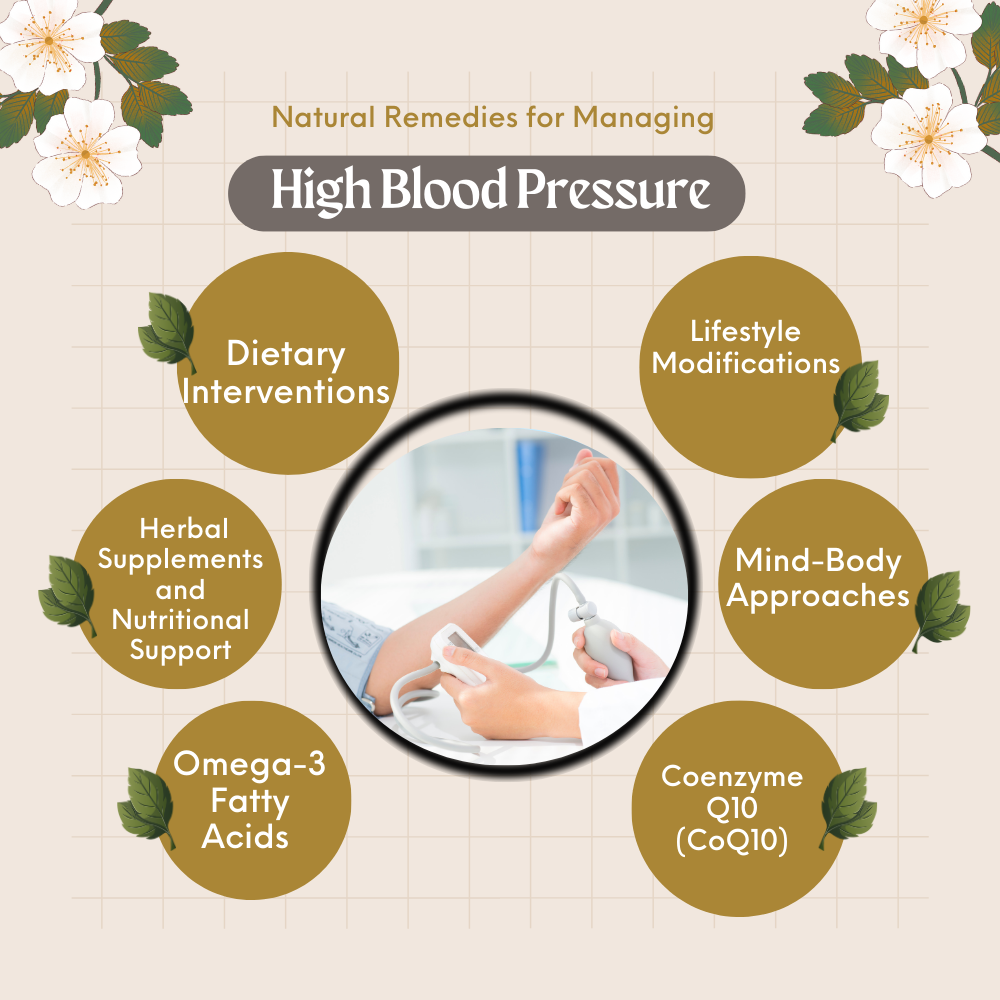
A. Dietary Interventions:
- DASH Diet (Dietary Approaches to Stop Hypertension):
- The DASH diet emphasizes consuming a variety of nutrient-rich foods, including fruits, vegetables, whole grains, lean proteins, and low-fat dairy products.
- It encourages reducing sodium intake and increasing potassium, magnesium, and calcium consumption, which are associated with lower blood pressure.
- Following the DASH diet has been shown to lower blood pressure and reduce the risk of cardiovascular disease.
- Sodium Restriction and Potassium-Rich Foods:
- Limiting sodium intake by avoiding processed and high-sodium foods can help lower blood pressure.
- Consuming potassium-rich foods such as bananas, oranges, spinach, and sweet potatoes can counteract the effects of sodium and promote healthy blood pressure levels.
- Mediterranean Diet and Other Beneficial Eating Patterns:
- The Mediterranean diet emphasizes fruits, vegetables, whole grains, fish, nuts, and olive oil while limiting red meat and processed foods.
- This eating pattern is rich in antioxidants, fiber, and healthy fats, which can help reduce inflammation and improve cardiovascular health.
B. Lifestyle Modifications:
- Regular Exercise and Physical Activity:
- Engaging in regular aerobic exercise, such as brisk walking, cycling, or swimming, for at least 30 minutes most days of the week can help lower blood pressure.
- Strength training and flexibility exercises can also contribute to overall cardiovascular health and blood pressure management.
- Stress Reduction Techniques: Meditation, Yoga, and Deep Breathing:
- Practicing mindfulness meditation, yoga, deep breathing exercises, or progressive muscle relaxation techniques can help reduce stress levels and lower blood pressure.
- These techniques promote relaxation, improve emotional well-being, and may have a positive impact on blood pressure control.
- Adequate Sleep and Sleep Hygiene Practices:
- Getting sufficient sleep (7-9 hours per night for most adults) is essential for maintaining optimal blood pressure levels.
- Practicing good sleep hygiene, such as maintaining a regular sleep schedule, creating a comfortable sleep environment, and avoiding stimulants like caffeine before bedtime, can support healthy sleep patterns.
C. Herbal Supplements and Nutritional Support:
- Garlic, Hawthorn, and Other Herbal Remedies:
- Garlic and hawthorn supplements have been studied for their potential benefits in lowering blood pressure and improving cardiovascular health.
- Other herbal remedies such as green tea, hibiscus, and celery seed extract may also have mild blood pressure-lowering effects.
- Omega-3 Fatty Acids and Coenzyme Q10 (CoQ10):
- Omega-3 fatty acids, found in fatty fish like salmon and mackerel, as well as in fish oil supplements, have been associated with lower blood pressure levels.
- Coenzyme Q10 (CoQ10) is a naturally occurring antioxidant that may help improve blood pressure control and cardiovascular health.
- Vitamin and Mineral Supplements: Magnesium, Calcium, and Potassium:
- Magnesium, calcium, and potassium are essential minerals that play a role in blood pressure regulation.
- Supplements or foods rich in these nutrients may help support healthy blood pressure levels when incorporated into a balanced diet.
D. Mind-Body Approaches:
- Acupuncture and Acupressure:
- Acupuncture and acupressure techniques may help lower blood pressure by promoting relaxation and improving blood flow.
- These traditional Chinese medicine practices involve stimulating specific points on the body to restore balance and alleviate symptoms.
- Biofeedback and Relaxation Therapy:
- Biofeedback therapy uses electronic monitoring devices to provide real-time feedback on physiological processes, allowing individuals to learn how to control bodily functions such as blood pressure through relaxation techniques.
- Relaxation therapy techniques such as progressive muscle relaxation, guided imagery, and autogenic training can help reduce stress and lower blood pressure.
- Tai Chi and Qigong Practices:
- Tai Chi and Qigong are gentle mind-body exercises that involve slow, flowing movements, deep breathing, and meditation.
- These ancient Chinese practices promote relaxation, improve balance and coordination, and may have beneficial effects on blood pressure and cardiovascular health.
By incorporating these natural remedies and lifestyle modifications into daily routines, individuals can complement conventional medical treatments and support overall cardiovascular health. It’s essential to consult with a healthcare professional before starting any new dietary supplements or herbal remedies, especially if you have existing health conditions or are taking medications. Regular monitoring of blood pressure levels and ongoing communication with healthcare providers are crucial for effectively managing high blood pressure naturally.
VI. Integrative Approaches to Hypertension Management:
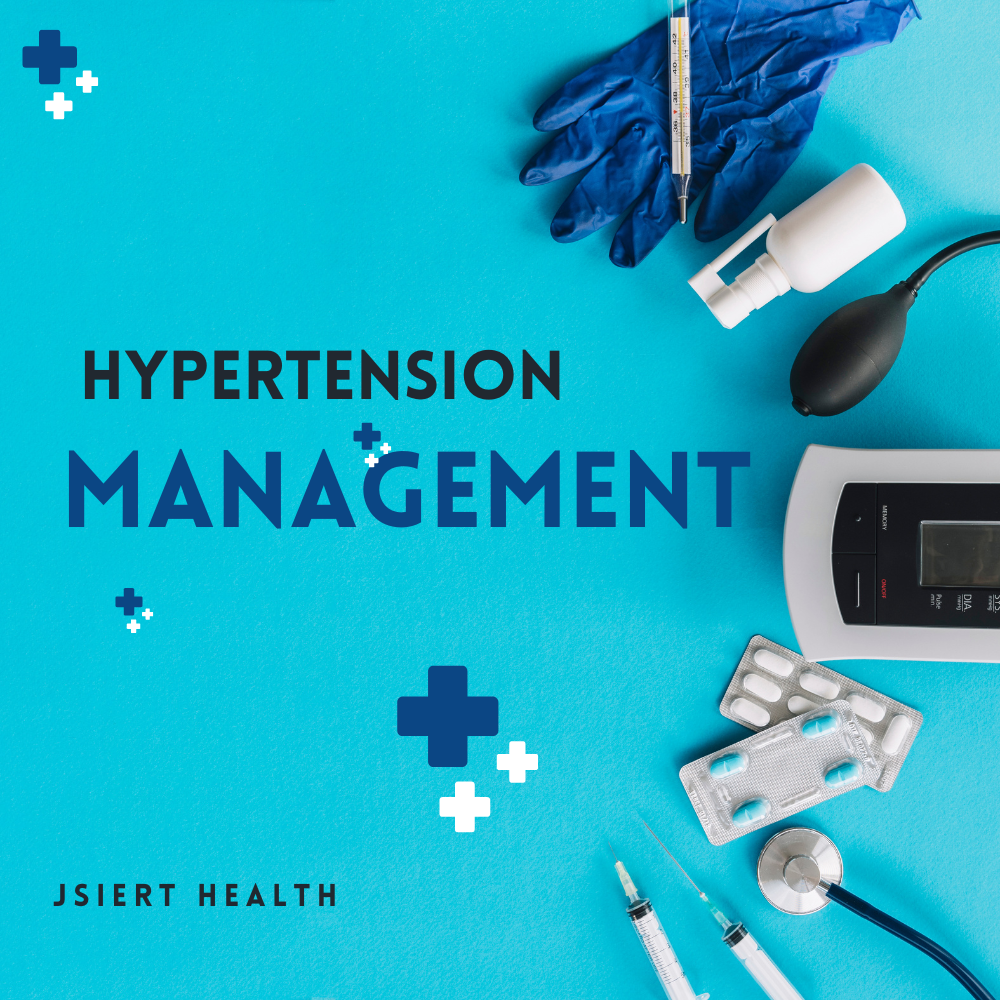
A. Combining Conventional and Natural Therapies:
Integrative hypertension management involves combining conventional medical treatments with natural therapies to address the underlying causes and risk factors associated with high blood pressure. This approach recognizes the importance of both pharmacological interventions and lifestyle modifications in achieving optimal blood pressure control and overall cardiovascular health.
- Medication Management: Conventional antihypertensive medications prescribed by healthcare providers play a crucial role in lowering blood pressure and reducing the risk of cardiovascular complications.
- Natural Remedies: Incorporating natural remedies such as dietary interventions, herbal supplements, stress reduction techniques, and mind-body practices can complement conventional treatments and support blood pressure management. These natural approaches may help improve overall health and reduce reliance on medication in some cases.
B. Personalized Treatment Plans and Holistic Health Approaches:
- Individualized Assessment: Integrative hypertension management involves conducting a comprehensive assessment of each individual’s health status, including their medical history, lifestyle factors, dietary habits, stress levels, and genetic predispositions.
- Personalized Treatment Plans: Based on the individual’s assessment, personalized treatment plans are developed to address specific risk factors and health goals. These plans may include a combination of dietary modifications, exercise regimens, stress reduction techniques, and targeted supplementation tailored to the individual’s needs.
- Holistic Health Approaches: Integrative care focuses on treating the whole person rather than just the symptoms of hypertension. It emphasizes lifestyle modifications, preventive measures, and holistic health practices to promote overall well-being and cardiovascular health.
C. Importance of Patient Education and Empowerment:
- Empowering Patients: Integrative hypertension management encourages active participation and empowerment of patients in their own healthcare journey. Patients are educated about the importance of lifestyle modifications, self-care practices, and adherence to treatment plans.
- Health Literacy: Providing patients with comprehensive information about hypertension, its risk factors, and management strategies helps them make informed decisions about their health. This includes educating patients about the potential benefits and risks of both conventional and natural treatment options.
- Self-Management Skills: Patients are taught self-management skills such as monitoring their blood pressure at home, tracking their dietary and exercise habits, managing stress effectively, and recognizing warning signs of hypertension-related complications.
D. Collaborative Care: Involving Healthcare Providers and Wellness Practitioners:
- Multidisciplinary Approach: Integrative hypertension management involves collaboration between healthcare providers, including primary care physicians, cardiologists, dietitians, exercise physiologists, mental health professionals, and complementary and alternative medicine practitioners.
- Team-Based Care: Healthcare providers work together to develop coordinated treatment plans that address the various aspects of hypertension management, including medication management, lifestyle modifications, and complementary therapies.
- Communication and Coordination: Effective communication and coordination between members of the healthcare team ensure that patients receive comprehensive and holistic care. This includes sharing relevant information, coordinating appointments, and monitoring patients’ progress over time.
By integrating conventional and natural therapies, personalizing treatment plans, empowering patients through education, and promoting collaborative care, integrative approaches to hypertension management can enhance treatment outcomes, improve patient satisfaction, and promote long-term cardiovascular health and well-being.
VII. Practical Tips for Maintaining Optimal Blood Pressure:
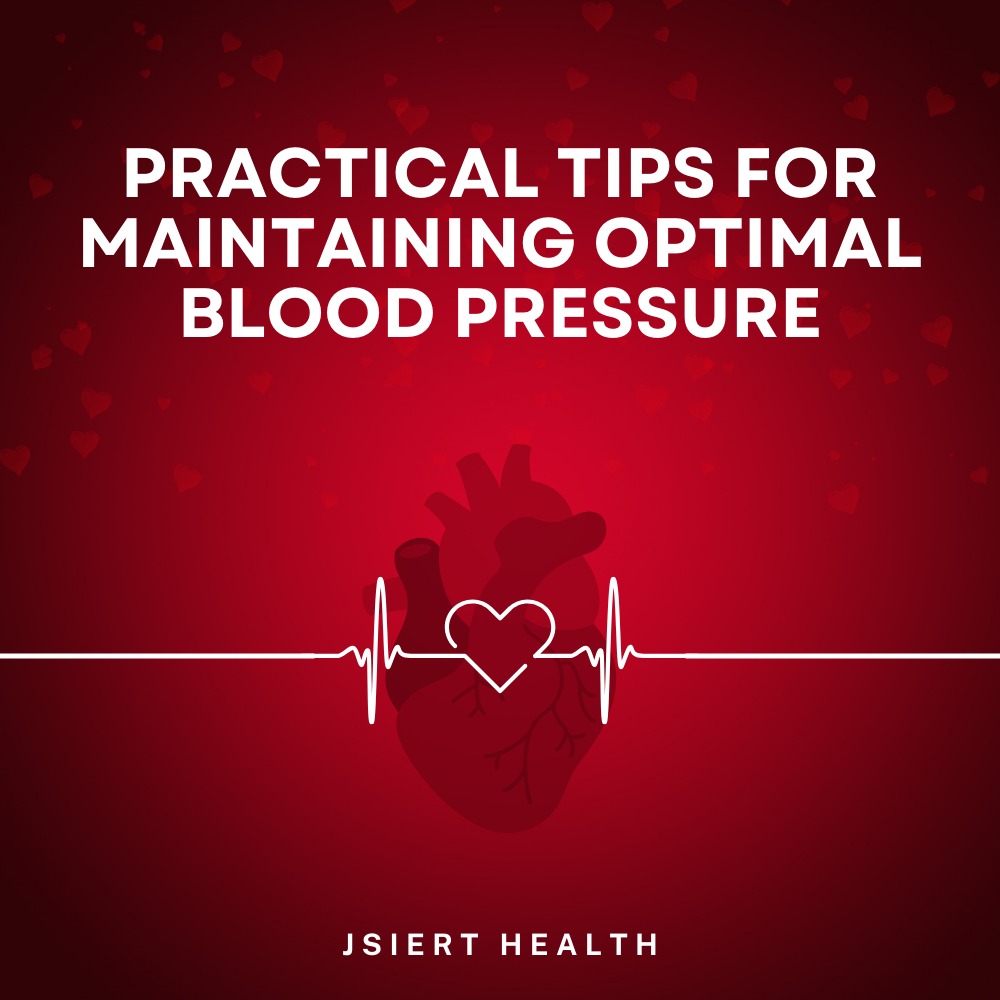
A. Monitoring Blood Pressure at Home:
- Invest in a Reliable Blood Pressure Monitor: Purchase a quality blood pressure monitor for home use, ensuring it is validated for accuracy by professional healthcare organizations.
- Establish a Regular Monitoring Schedule: Measure your blood pressure at the same time each day, preferably in the morning before consuming caffeine or engaging in physical activity, and in the evening.
- Keep a Record of Readings: Maintain a log of your blood pressure readings, including the date, time, and values obtained. Share this information with your healthcare provider during check-ups.
B. Keeping Track of Dietary Intake and Physical Activity:
- Follow a Heart-Healthy Diet: Adopt a balanced diet rich in fruits, vegetables, whole grains, lean proteins, and low-fat dairy products. Limit sodium intake, avoid processed foods, and reduce consumption of saturated and trans fats.
- Monitor Portion Sizes: Be mindful of portion sizes to avoid overeating and excessive calorie intake. Use measuring cups and food scales to control portion sizes, especially for high-calorie or high-sodium foods.
- Engage in Regular Physical Activity: Aim for at least 150 minutes of moderate-intensity aerobic exercise or 75 minutes of vigorous-intensity exercise per week. Incorporate activities you enjoy, such as walking, swimming, cycling, or dancing, into your routine.
C. Stress Management Strategies for Daily Life:
- Practice Relaxation Techniques: Incorporate relaxation techniques such as deep breathing exercises, progressive muscle relaxation, meditation, or guided imagery into your daily routine.
- Prioritize Time for Self-Care: Allocate time each day for activities that promote relaxation and well-being, such as reading, listening to music, spending time outdoors, or pursuing hobbies.
- Set Realistic Expectations: Avoid overcommitting yourself and learn to say no when necessary. Delegate tasks, prioritize responsibilities, and seek support from family, friends, or colleagues.
D. Building a Supportive Network and Seeking Professional Guidance:
- Surround Yourself with Supportive Individuals: Cultivate relationships with family members, friends, or support groups who understand and encourage your efforts to manage hypertension.
- Communicate Openly with Healthcare Providers: Maintain open communication with your healthcare team, including physicians, nurses, dietitians, and other specialists. Discuss any concerns, questions, or challenges you may encounter.
- Attend Regular Check-ups: Schedule regular follow-up appointments with your healthcare provider to monitor your blood pressure, review treatment plans, and address any changes in your health status.
By incorporating these practical tips into your daily life, you can take proactive steps to maintain optimal blood pressure levels and promote overall cardiovascular health. Consistency, commitment, and collaboration with healthcare professionals are key to achieving long-term success in managing hypertension effectively.
VIII. Case Studies and Success Stories:
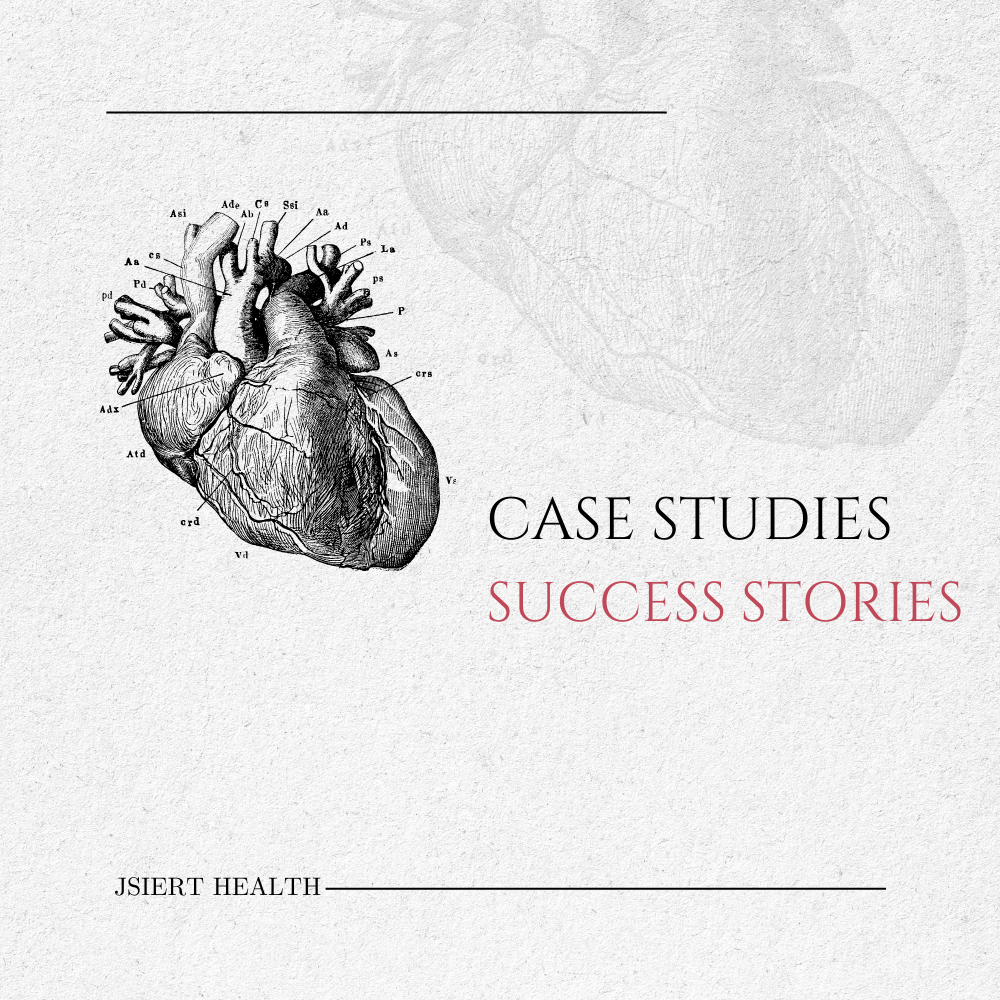
A. Real-Life Experiences of Individuals Managing High Blood Pressure:
- Case Study: John’s Journey to Blood Pressure Control
- John, a 55-year-old executive, was diagnosed with hypertension during a routine check-up. Concerned about the potential health risks, he decided to take action to manage his condition.
- With guidance from his healthcare provider, John implemented lifestyle modifications such as adopting the DASH diet, increasing physical activity, and reducing stress through mindfulness meditation.
- Through consistent monitoring of his blood pressure at home and regular follow-up appointments with his healthcare team, John successfully lowered his blood pressure to within normal range and reduced his risk of cardiovascular complications.
- Success Story: Sarah’s Struggle with Stress-Induced Hypertension
- Sarah, a 45-year-old working mother, experienced persistent high blood pressure readings attributed to chronic stress and anxiety.
- Seeking a holistic approach to managing her hypertension, Sarah incorporated stress management techniques such as yoga, deep breathing exercises, and regular relaxation practices into her daily routine.
- With ongoing support from her healthcare provider and the implementation of stress-reduction strategies, Sarah was able to significantly lower her blood pressure and improve her overall well-being.
B. Testimonials of Improved Health Outcomes through Natural Remedies:
- Testimonial: Jaylal’s Experience with Herbal Remedies for Hypertension
- Jaylal, a 60-year-old retiree, struggled to control his blood pressure despite taking multiple medications.
- Upon exploring natural remedies, Jaylal began incorporating garlic supplements and hawthorn tea into his daily regimen.
- Over time, Jaylal noticed a significant reduction in his blood pressure readings and experienced fewer side effects compared to prescription medications.
- Testimonial: Sevki’s Journey to Lower Blood Pressure with Lifestyle Modifications
- Sevki, a 50-year-old woman with a family history of hypertension, sought to manage her condition through lifestyle changes.
- By following the DASH diet, engaging in regular exercise, and practicing stress-reduction techniques, Sevki successfully lowered her blood pressure without the need for medication.
- Inspired by her progress, Sevki continues to prioritize healthy habits and encourages others to take proactive steps towards blood pressure control.
C. Lessons Learned and Practical Insights for Others Struggling with Hypertension:
- Key Takeaways:
- Consistent blood pressure monitoring and regular medical follow-up are essential for effective hypertension management.
- Lifestyle modifications, including dietary changes, exercise, stress reduction, and adequate sleep, play a critical role in controlling blood pressure.
- Integrative approaches that combine conventional treatments with natural remedies can offer personalized and holistic care.
- Building a support network and seeking professional guidance can provide valuable encouragement and resources for individuals navigating hypertension.
- Practical Insights:
- Find activities and strategies that promote relaxation and stress reduction, such as mindfulness meditation, yoga, or hobbies that bring joy.
- Prioritize self-care practices, including adequate sleep, healthy eating, and regular physical activity, to support overall well-being.
- Explore natural remedies and complementary therapies under the guidance of a healthcare provider, taking into account individual preferences and medical history.
- Share experiences and learn from others in similar situations, whether through support groups, online forums, or personal networks, to gain inspiration and motivation on the journey to better blood pressure control.
By sharing real-life experiences, testimonials, and practical insights, individuals can gain inspiration, motivation, and valuable insights for managing hypertension effectively and improving overall health outcomes.
IX. Future Directions and Research Perspectives:
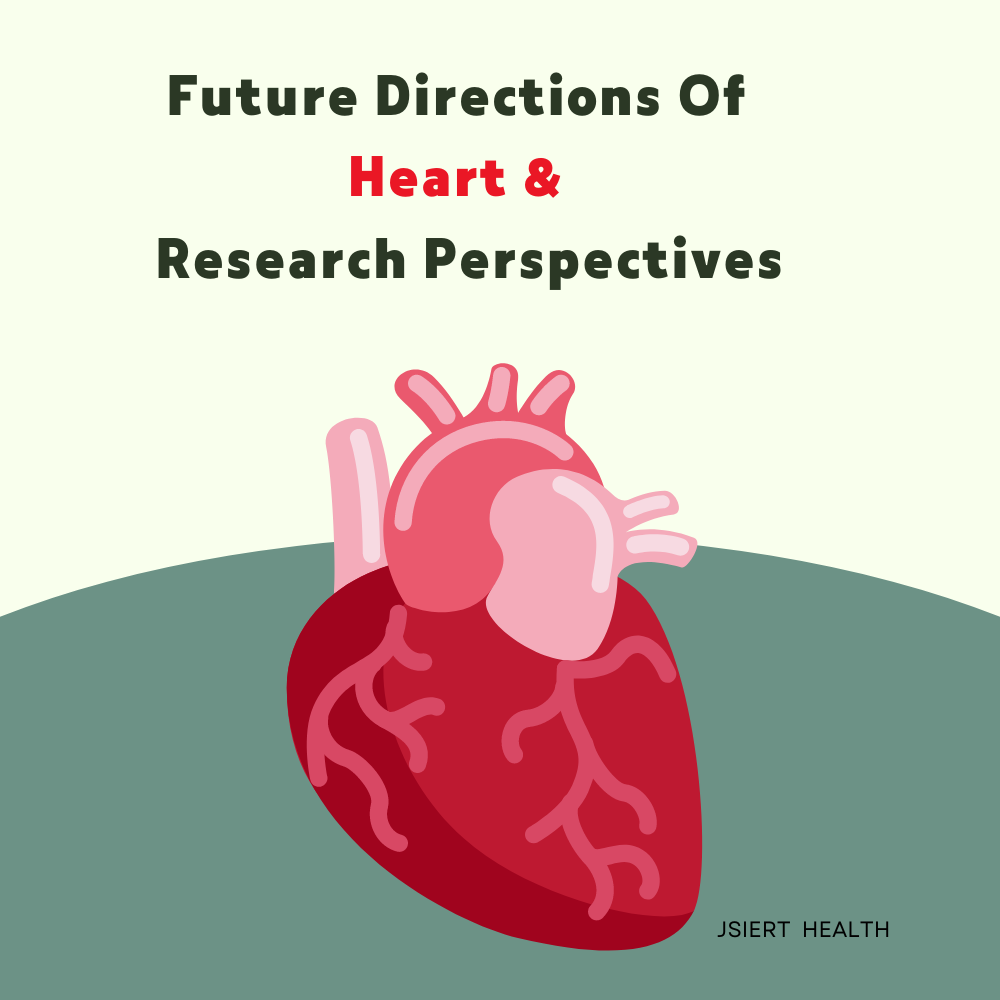
A. Ongoing Studies and Clinical Trials on Natural Remedies for Hypertension:
- Herbal Therapies:
- Ongoing clinical trials are investigating the efficacy and safety of herbal remedies traditionally used for hypertension, such as garlic, hawthorn, and ginger. These studies aim to provide more conclusive evidence regarding their effectiveness in lowering blood pressure and managing hypertension.
- Researchers are exploring the mechanisms of action of herbal compounds and their potential interactions with conventional antihypertensive medications to optimize treatment outcomes and minimize adverse effects.
- Nutritional Supplements and Dietary Approaches:
- Continued research is focusing on the role of nutritional supplements, including omega-3 fatty acids, magnesium, potassium, and Coenzyme Q10, in hypertension management. Clinical trials are assessing their effects on blood pressure regulation, cardiovascular health, and overall well-being.
- Long-term observational studies are evaluating the impact of dietary interventions, such as the DASH diet, Mediterranean diet, and plant-based diets, on blood pressure control and cardiovascular outcomes.
- Complementary Therapies:
- Ongoing studies are investigating complementary therapies, such as acupuncture, biofeedback, mindfulness-based stress reduction (MBSR), and yoga, in reducing blood pressure and improving cardiovascular health. These studies aim to elucidate the mechanisms underlying their therapeutic effects and identify optimal treatment protocols.
B. Emerging Trends in Integrative Medicine and Hypertension Management:
- Personalized Medicine Approaches:
- Emerging trends in integrative medicine emphasize personalized treatment plans tailored to individual characteristics, preferences, and genetic factors. Advances in genomic medicine, biomarker analysis, and digital health technologies are facilitating the development of personalized interventions for hypertension management.
- Integrative medicine practitioners are increasingly incorporating genetic testing, pharmacogenomics, and lifestyle assessments into clinical practice to optimize treatment outcomes and enhance patient engagement.
- Holistic Health Models:
- There is a growing recognition of the interconnectedness of mind, body, and spirit in hypertension management. Integrative medicine models emphasize holistic health principles, including the integration of conventional treatments with natural remedies, lifestyle modifications, and mind-body practices.
- Emerging approaches such as functional medicine, lifestyle medicine, and mind-body medicine focus on addressing underlying imbalances and promoting self-healing mechanisms to achieve optimal blood pressure control and overall well-being.
- Collaborative Care Models:
- Multidisciplinary care teams are playing an increasingly important role in integrative hypertension management. Collaborative care models involve healthcare providers from diverse disciplines, including primary care physicians, cardiologists, nutritionists, exercise physiologists, and mind-body therapists, working together to develop comprehensive treatment plans.
- These collaborative care models emphasize patient-centered care, shared decision-making, and continuity of care across different healthcare settings to optimize treatment outcomes and improve patient satisfaction.
C. Potential Challenges and Opportunities in Promoting Holistic Health Practices:
- Evidence-Based Practice:
- While there is growing interest in natural remedies and complementary therapies for hypertension, challenges remain in establishing robust scientific evidence to support their efficacy and safety. Further research is needed to conduct well-designed clinical trials, meta-analyses, and systematic reviews to validate the effectiveness of these interventions.
- Research gaps exist in understanding the mechanisms of action of natural remedies, identifying optimal dosages and formulations, and evaluating their long-term effects on blood pressure control and cardiovascular outcomes.
- Integration into Healthcare Systems:
- Integrating holistic health practices into mainstream healthcare systems requires overcoming barriers such as limited reimbursement for non-conventional treatments, lack of standardized protocols, and varying levels of acceptance among healthcare providers. Efforts are needed to promote interdisciplinary collaboration, develop evidence-based guidelines, and enhance education and training in integrative medicine.
- Increasing public awareness, patient education, and access to integrative healthcare services can help promote holistic health practices and empower individuals to make informed decisions about their health.
- Policy and Advocacy:
- Advocacy efforts are essential for promoting policy changes that support holistic health practices, including expanded insurance coverage for integrative healthcare services, reimbursement for evidence-based natural remedies and complementary therapies, and integration of integrative medicine into medical education and training programs.
- Collaboration among policymakers, healthcare organizations, professional associations, patient advocacy groups, and academic institutions is needed to advance research, education, and access to holistic health practices for hypertension management.
By addressing ongoing research gaps, embracing emerging trends in integrative medicine, and overcoming challenges related to promoting holistic health practices, healthcare providers and policymakers can enhance hypertension management strategies and improve outcomes for individuals with high blood pressure.
Conclusion:
Managing high blood pressure effectively requires a multifaceted approach that integrates conventional medical treatments with natural remedies and lifestyle modifications. By understanding the symptoms, causes, and available management strategies, individuals can take proactive steps towards improving their cardiovascular health and overall well-being. With proper guidance from healthcare professionals and a commitment to healthy living, hypertension can be effectively managed, reducing the risk of associated complications and enhancing quality of life.
FAQ for Managing High Blood Pressure: Symptoms, Causes, and Natural Remedies
- What are the common symptoms of high blood pressure?
- High blood pressure often does not cause noticeable symptoms, earning it the nickname “the silent killer.” However, some individuals may experience symptoms such as headaches, dizziness, blurred vision, chest pain, and shortness of breath in severe cases. It’s important to monitor blood pressure regularly, especially if you have risk factors for hypertension.
- What are the main causes of high blood pressure?
- The exact cause of high blood pressure is often unknown, but several factors can contribute to its development. These include genetics, lifestyle choices such as unhealthy diet and lack of exercise, stress, age, gender, and underlying medical conditions like kidney disease and thyroid disorders.
- How can I naturally lower my blood pressure?
- Natural remedies for managing high blood pressure include dietary changes such as following the DASH diet (Dietary Approaches to Stop Hypertension), reducing sodium intake, increasing potassium-rich foods, engaging in regular exercise, managing stress through relaxation techniques like meditation and yoga, getting adequate sleep, and considering herbal supplements and nutritional support like garlic, omega-3 fatty acids, and Coenzyme Q10.
- Is high blood pressure a serious condition?
- Yes, high blood pressure, if left untreated or poorly managed, can lead to serious health complications such as heart disease, stroke, kidney damage, vision loss, and other cardiovascular problems. It is essential to monitor blood pressure regularly and take steps to manage it effectively to reduce the risk of complications.
- What lifestyle changes can help manage high blood pressure?
- Lifestyle modifications play a crucial role in managing high blood pressure. These include maintaining a healthy weight, adopting a balanced diet rich in fruits, vegetables, whole grains, and lean proteins, limiting alcohol consumption, quitting smoking, staying physically active, managing stress, and getting regular check-ups with healthcare providers.
- Are there any natural supplements or herbs that can help lower blood pressure?
- Certain herbal supplements and nutritional support have been studied for their potential benefits in lowering blood pressure. These include garlic, hawthorn, green tea, omega-3 fatty acids, magnesium, potassium, and Coenzyme Q10. However, it’s essential to consult with a healthcare provider before starting any new supplements, as they may interact with medications or have adverse effects.
- Can stress contribute to high blood pressure?
- Yes, chronic stress can contribute to high blood pressure by causing the body to release stress hormones like cortisol and adrenaline, which can narrow blood vessels and increase heart rate. Managing stress through relaxation techniques, mindfulness practices, and lifestyle changes can help lower blood pressure and improve overall health.
- How often should I monitor my blood pressure?
- The frequency of blood pressure monitoring may vary depending on individual risk factors, medical history, and healthcare provider recommendations. Generally, individuals with hypertension or at risk of high blood
pressure should monitor their blood pressure regularly at home, aiming for at least once a day or as recommended by their healthcare provider. It’s essential to keep track of blood pressure readings and report any significant changes or concerns to your healthcare team.
- Can I manage high blood pressure without medication?
- In some cases, lifestyle modifications alone may be sufficient to manage high blood pressure, especially if it is mild to moderate. However, for many individuals, a combination of lifestyle changes and medication may be necessary to achieve optimal blood pressure control. It’s important to work closely with your healthcare provider to develop a personalized treatment plan that meets your needs and goals.
- What are the potential complications of untreated high blood pressure?
- Untreated high blood pressure can lead to serious health complications over time, including heart disease, stroke, kidney damage, vision problems, peripheral artery disease, and cognitive decline. It’s crucial to manage high blood pressure effectively to reduce the risk of these complications and maintain overall health and well-being.
Remember to consult with your healthcare provider before making any significant changes to your lifestyle or starting any new treatments or supplements for managing high blood pressure. They can provide personalized guidance and support to help you achieve optimal blood pressure control and improve your overall health outcomes.